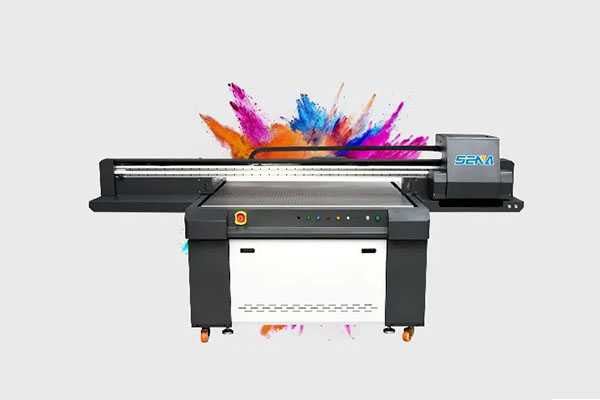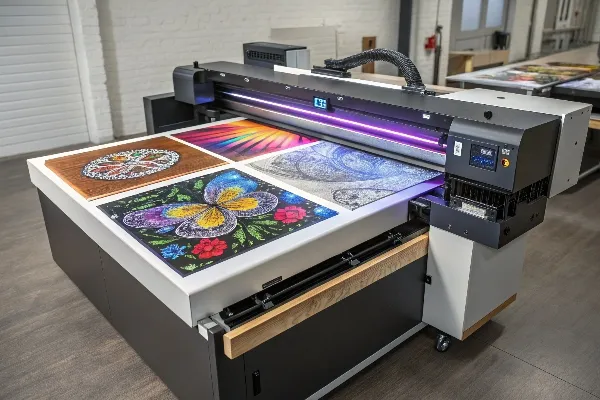Avoid your inquiry is delay response, please enter your WhatsApp/WeChat/Skype along with the message, so we can contact you at the very first time
We will reply you within 24 hours. If for urgent case, please add WhatsApp: +8617888313102, or WeChat: +86 17864107808. Or call +86 17864107808 directly.
*We respect your confidentiality and all information are protected. We will only use your information to respond to your inquiry and will never send unsolicited emails or promotional messages.
I felt stuck when I had to print on unusual materials. I needed a machine that could handle many surfaces without losing quality.
A custom UV flatbed printer can personalize many items with vibrant, durable prints. It supports detailed designs and fast curing, which saves time and boosts production efficiency.

custom uv flatbed printer
I started researching different UV machines. I compared their print speeds, ink compatibility, and support for flexible or rigid materials. I learned that each printer has unique features. I will share my insights below.
I sometimes wondered if investing in UV printing was risky. I worried about costs and market demand.
UV printing offers strong color quality, quick drying, and flexibility across industries. It can open new markets, expand services, and bring long-term profits if managed well.

I want to look at why UV printing can be a good business choice. I see how many companies need customized prints on diverse materials. This covers signage, packaging, promotional items, and more. I have noticed that UV printing stands out because of the ink’s ability to cure quickly under ultraviolet light. This reduces waiting time, so orders can be completed at a faster pace. Clients value short lead times because they can respond to market trends or customer requests promptly. A UV printer helps me serve those needs and build strong relationships with returning customers.
I also observe that UV-printed products are durable and scratch-resistant. This gives clients the assurance that their images or logos will stay bright for a long time. This feature is especially important for items exposed to harsh or outdoor conditions, such as banners or store displays. I find that business owners appreciate quality prints that maintain appearance after repeated use.
Cost is another factor that influences whether UV printing is profitable. The initial investment can seem high, but the long-term gains often outweigh the cost. Once I have the machine, I can handle multiple projects in-house, which cuts outsourcing expenses. I also see that the range of possible applications grows with each new substrate or design style I explore. This diversity of projects lowers my risk because I am not stuck in one narrow market. If one category slows down, another can pick up.

custom uv flatbed printer
I believe that UV printing can also contribute to eco-friendly objectives. Modern UV inks have low volatile organic compounds (VOCs), which helps me meet environmental standards. Some clients prefer green processes, and that can boost the appeal of my services. I can market this advantage to attract businesses that want both quality and sustainability. By focusing on creative solutions, I can tailor products for clients who crave unique looks. This can lead to premium pricing and better profit margins. That is how UV printing stands apart from older methods and why I think it remains a strong option for entrepreneurs.
I felt uncertain when I saw so many printer models. I did not know which features would give me the best returns.
I compare print size, resolution, material compatibility, and available support. I also check after-sales service and warranty to protect my investment.

I think choosing a new printer for my business is an important decision. I consider the printer’s compatibility with different substrates, such as plastic, acrylic, metal, or cardboard. This feature matters if I want to serve multiple markets. I also pay attention to resolution and print speed. If my clients require high-detail images, resolution is critical. If I handle large orders, speed can be the deciding factor. Sometimes, I must balance these two elements. I look at real-world samples, if possible, to see how well the printer performs under normal conditions.
Support and maintenance options can influence my choice. I have dealt with technical problems in the past. Quick and effective assistance can save me from long downtimes and lost orders. A good warranty or service plan shows me that the manufacturer believes in their product. It also relieves the pressure of unexpected repair costs. I often read reviews or talk to other users to see how the printer performs after months or years of use. This helps me predict the total cost of ownership.
I also review ink usage and price. Some printers use special inks that might cost more but deliver better color or adhesion. I calculate how many prints I can make from one set of cartridges. This cost-per-print analysis helps me forecast operating expenses and profit margins. Another consideration is the printer’s footprint. I must ensure I have enough space for it to run smoothly, especially if I have a smaller workshop. Layout and ventilation are also important if the printer generates fumes.
When I narrow down my options, I look at user-friendly features. Modern printers sometimes offer automatic calibration or print queue management. These can save time and reduce errors. If I plan to scale up my operation, I might need a unit with software that integrates with other systems. This synergy can help me automate tasks like color matching or scheduling. In my experience, a well-researched decision pays off in the long run. The right UV printer can be a cornerstone of my production line, enabling me to meet deadlines, maintain consistent quality, and adapt to new ideas with ease.
I felt unsure about factors like machine size, ink type, and print head technology. I wanted a printer that matched my expansion goals.
I look at my production volume, substrate needs, and required color fidelity. I pick a printer that balances performance, reliability, and budget.

I think selecting the right UV printer requires a clear understanding of my workflow. First, I outline the typical order sizes I handle and the kinds of materials I plan to print on. If I produce large billboard graphics, I need a printer with a broad print area. If I specialize in small promotional items, a compact machine might be enough. I also think about the thickness of the materials. Some UV flatbed printers1 handle substrates of various thicknesses, while others limit me to certain sizes. This matters if I want to expand into rigid packaging or sign boards.
Ink type and color management also influence my choice. Some UV printers support multiple ink channels, including white or varnish. These extra channels can add special effects, such as spot gloss or underlay for transparent materials. That feature may set me apart in a competitive market. I also compare the brand’s color calibration methods. I need consistent and accurate color reproduction. This is critical for brand logos or product packaging. If the printer’s color management system is robust, I will have an easier time matching client demands.
Maintenance is another key factor. UV print heads can clog if not cleaned properly. I look for automated cleaning2 or nozzle checks that help me avoid downtime. If I can find a printer with a well-designed print head system, I save time and resources. Some printers include built-in sensors that detect misalignment or color shift. This automation cuts human error, which is a big benefit if my production schedule is busy. I also check the type of UV lamps used. LEDs run cooler and last longer, but they might cost more initially. Traditional mercury lamps can be cheaper but generate more heat and may need more frequent replacement.
Finally, I consider the brand’s reputation and the availability of parts or upgrades. A printer is a major investment, so I want to be sure I can update or fix it without delay. I read user forums and talk to industry peers to see how well a brand handles spare parts requests. I also see if the manufacturer releases regular software updates. This can keep the printer compatible with new design tools or operating systems. When I follow these steps, I usually feel confident that I have selected a printer that meets my needs now and can grow with my business. I want the technology to advance alongside my ambitions.
I believe a well-chosen UV flatbed printer can handle many designs, expand services, and help me stay competitive. It is worth the effort to find the right one.